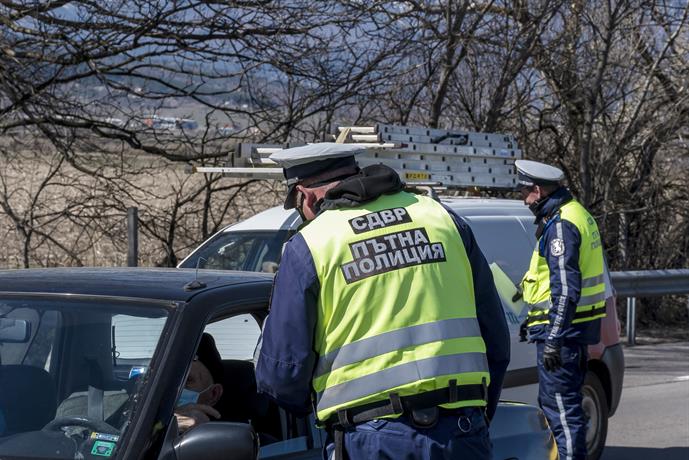
Interior Ministry employees went on another protest. The reason – the allegations of the current caretaker Interior Minister Kalin Stoyanov that „the future caretaker Prime Minister is subjected to brutal political pressure“ and „an unprecedented attempt to use the Ministry of Interior /MIA/ for political purposes“. But aren’t the department’s employees being used in this way too – to make them protest over political decisions? And what do the employees get in return? Political umbrellas, perhaps?
This is not the first case in which the impression has been given that police officers are being used to serve political ends. More than one or two police repression and arbitrariness have been recorded during these situations. One of the most striking examples of this were the protests of 2020, during which police officers had to guard demonstrations demanding the resignations of Prime Minister Boyko Borissov and then Prosecutor General Ivan Geshev. They began on 9 July, and on 10 July a group of police officers dragged students behind the columns of the Council of Ministers building and beat them severely. Among the group of detained youths was student Evgeni Marchev, who was also found to have been beaten on 11 July. Footage from a camera at the Council of Ministers was subsequently released.
The video showed police officers dragging several people away from the demonstrators, some of whom were literally dragged behind the columns of the building where the beating began. Law enforcement officers can be seen kicking, punching and beating the youths with batons, one after the other. Among the policemen is a woman who is also kicking the detainees. They handcuff them and put them on the ground on their stomachs. Other policemen appear, one of whom steps on an arrested person with his foot. Some of the demonstrators are dragged by the face and thrown on top of each other behind the column. Only a female detainee is not hit and is left sitting handcuffed, during which time the youths take occasional kicks even in their helpless state. After about 30 minutes a police van appeared and the detainees were loaded into it.
At the moment, there is no information about a verdict against the police officers involved in the beating of protesters on 10/11 July 2020 in front of the Council of Ministers building in Sofia. Although four police officers have been identified as participants in the violence, no legal action has been taken against them to date. Instead, in some cases preliminary investigations have been launched against the injured protesters themselves.
In January this year, during a special operation in Plovdiv, four people were arrested, two of whom were police officers. The reason – participation in an armed organized criminal group for threats and extortion. According to the state prosecution – these are Galin Kolev from the First and Martin Lambrev from the Third district police station. The accused extorted two citizens, from whom they took 35 000 leva by force and threat. They also threatened fans to freely express their opinion about Botev’s football policy.
So far, no convictions have been issued for these two policemen either, although extensive investigations and actions related to corruption and other serious police misconduct have been carried out, the trial against them is still pending. The trial is ongoing and no final judgments have been announced to date.
In July, a police officer was arrested for beating a student near a restaurant on Garden Beach. He is an employee of the Fourth district in Burgas. The reason for the brutal beating of the young man was a knocked down piece of pizza on the ground during a party to celebrate Julai. Moving among the many people, a friend of the victim knocked down the pizza, but this infuriated one of the security guards, who slapped him. The victim tried to defend his friend but received a hard blow to the face, most likely with a metal box.
The investigation against the officer is ongoing, but no final judgments or verdicts have been announced to date. Even early in the case, suspicions were raised that an attempt was being made to cover up the perpetrator of the beating.
These are just some of the dozens of crimes involving police officers arrested over the past four years. The lack of convicted police officers in these cases, which have become public knowledge, raises suspicions about the independence of the prosecution and the judiciary. And how many of these crimes involving police officers have not been made public at all? There is also silence about investigations related to corruption in the Ministry of the Interior.
During the period under review, the number of police officers caught while drunk or drugged in the course of their duties was not small – in 2022 a drugged policeman from the Eighth District Police Station hit a parked car in the capital, in 2023 a drunk policeman was caught while on duty in Pavel Banya, and in 2024 drunk policemen caused spectacular crashes in Nova Zagora and Veliko Tarnovo. It was precisely because of such cases that an attempt was made in early 2023 to introduce alcohol and drug testing for police officers, but because of multiple positive samples, the method was ruled out of order. The motive – the positive result was due to a number of prescription drugs and thus once again a number of irregularities were covered up. It should be recalled that although the tests were declared inaccurate – they remained valid for Bulgarian citizens who do not have the protection of the Ministry of Interior and other institutions tied to it.
Against this backdrop, since 2020 the salaries of police officers in Bulgaria have been increased at least several times:
- November 2020: police officers received a decision to increase their salaries by 15% from 2021. This increase was part of measures to improve working conditions in the sector and was the result of a social partnership between the Ministry of Interior and the trade unions.
- 2022 and 2023: Police officers’ salaries were increased, but not as significantly as in previous years. However, the increases were part of the government’s policy to raise public sector wages.
Since 2020, police officers in Bulgaria have received new vehicles and equipment several times:
- November 2020: new vehicles and equipment have been purchased and delivered to the Ministry of Interior as part of efforts to modernise the police and improve the efficiency of police patrols.
- 2021: This year also saw the delivery of new vehicles to various police departments, including the Border Police, to improve control at the country’s borders.
- 2022: Deliveries of new vehicles and equipment continued, including specialised vehicles for the Border Police and patrol cars for general policing needs.
- 2023: In connection with increasing modernisation needs, the police received new patrol vehicles as well as new equipment to maintain road security.
- 2024: A total of 462 new vehicles were delivered this year, including 86 high-speed vehicles and 110 specialised off-road vehicles for border police. These deliveries are part of a plan to modernise the police and improve their mobility and incident response.
In the background of all this, there are dozens of publications accusing the current caretaker interior minister, Kalin Stoyanov, of being in touch with Delyan Peevski, and here the question arises – whose interests is he serving – those of the ministry or political ones? Why does he refuse to comply with the repeated calls for his resignation coming from different places? During his time, the high-speed police cars were delivered, which caused a wide response in the society whether they are really needed, but not a single conviction has been achieved in the publicly known cases of police violence in the country.
Amid growing doubts about the way the police and police officers are used for political purposes, the lack of accountability and justice in cases of police violence continues to undermine the credibility of the system. Despite significant investment in improving police salaries and equipment, unresolved cases of police violence and corruption remain a serious problem. Rather than being an example of law and justice, institutions seem more inclined to cover up misconduct, calling into question the true priorities of the Ministry of Interior and the role of political pressure on police performance.
Mass dismissals in the State Enterprise „Port Infrastructure“? What is behind the personnel changes?

















[…] Are policemen used for political purposes and what do they gain? […]